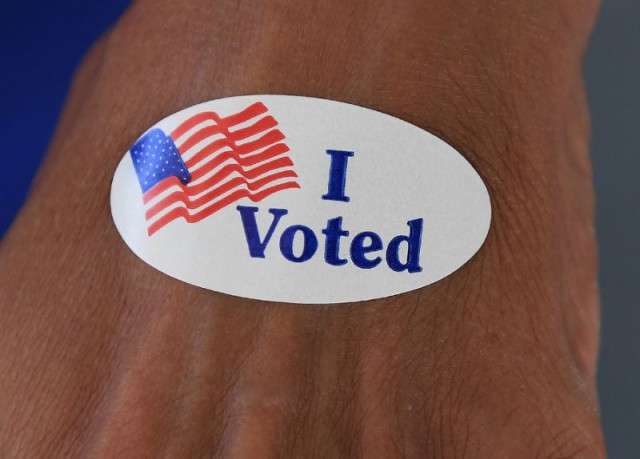Marijuana, abortion, greyhounds: the local issues on US midterm ballots
Americans cast ballots on slew of local initiatives in the recent midterm elections

A woman shows an 'I Voted' sticker during the US midterm elections, in which voters also cast ballots on a range of local initiatives from legalizing recreational marijuana to banning greyhound racing. PHOTO AFP
Marijuana
Michigan became the 10th state to legalise recreational marijuana, and in the future residents will be able to grow up to 12 plants for their own personal use.
A 10-per cent tax was imposed on marijuana sales, with the revenue to be used to fund local councils, education and transport.
Missouri and Utah each legalised medical marijuana, which will carry a tax of 4 per cent, with the funds earmarked to support health care for veterans.
Abortion
Voters in Alabama and West Virginia approved amendments aimed at limiting future access to abortion.
The Alabama amendment aimed to “support the sanctity of unborn life and the rights of unborn children, most importantly the right to life in all manners.”
The text of the proposal stated that “this state does not protect the right to abortion or require the funding of abortion.” The state makes no exception for abortions in cases where the pregnancy results from incest, rape or where the mother’s life is in danger.
Trump makes final push in US midterm elections
Women’s rights advocates fear the measures could lead to a challenge to the landmark Roe vs Wade Supreme Court ruling of 1973, especially at a time when appointments by President Donald Trump have swung the court far to the right.
Justice
Louisiana scrapped a law dating back to its segregated past that allowed non-unanimous decisions injuries deliberating in felony trials.
The law, from 1898, allowed a jury to convict a person of felony by only 10 out of 12 jury votes, a move designed to negate the influence of black jury members who were allowed by the 14th Amendment after the Civil War to serve on juries.
Its stated aim was to “perpetuate the supremacy of the Anglo-Saxon race in Louisiana”.
Oregon is the only other state that does not require a unanimous jury decision in felony cases, except for murder.
Florida pass an initiative to restore voting rights to convicted felons who have served their sentence, except for those convicted of sex crimes or murder.
That will give an estimated 1.5 million people the right to cast ballots in a key swing state in presidential elections.
Colorado also voted to remove the word “slavery” from its statute books as a punishment for crime.
The western state’s constitution had until Tuesday’s vote stated that “there shall never be in this state either slavery or involuntary servitude, except as a punishment for crime”.
Minimum wage
Missouri approved raising the minimum wage from US$7.83 (RM32.51) an hour to US$12 by 2023. In Arkansas, it will go up from US$8.50 to US$11 an hour by 2021.
The Ten Commandments
Alabama voted to allow the display of the biblical Ten Commandments in public buildings and schools.
Environment
Nevada backed a measure calling for public electricity providers to increase the amount of power generated from renewable sources from 20 per cent to 50 per cent by 2030.
Midterm election loss won't put Trump back in his box
Under the western state’s regulations, however, the proposal has to be approved again in a second election, in 2020, to become law.
Florida banned offshore drilling in waters belonging to the state and also forbade vaping in the workplace.
Animal rights
In Florida, 69 per cent of voters supported a ban on greyhound racing to come into effect by 2020, backing animal rights activists who denounce the sport as cruel.
Florida has 12 of the United States’ 18 dog tracks, while 40 US states ban betting on greyhound races.
California passed an initiative requiring all eggs in the state to come from cage-free hens by 2022, while setting minimum cage size requirements for pigs and calves raised for veal.
Alaskans however rejected a ballot measure increasing protections for wild salmon and their habitat, that would have tightened the permitting process for oil developments, mines and dams.
Tech tax for homeless
San Francisco voters backed a tax on the city’s wealthiest companies to tackle homelessness, passing a measure that divided the tech community.
A tally posted Wednesday showed that 60 per cent of voters in the city that is home to Airbnb, Uber, Salesforce, and Twitter cast ballots in favour of “Proposition C,” a local ballot measure brought about by a 28,000 signature petition this summer.
Designed to rake in US$250 to US$300 million in taxes per year, the Robin Hood-esque measure is intended to fund housing for 5,000 people and finance mental health and housing aid services, according to its backers.
Generally, San Francisco’s tech bosses — including Twitter chief Jack Dorsey and Patrick Collison of payment start-up Stripe — resisted the proposal.
But billionaire Marc Benioff, head of cloud computing firm Salesforce, pumped millions of dollars into the “Yes On C” campaign.



















COMMENTS
Comments are moderated and generally will be posted if they are on-topic and not abusive.
For more information, please see our Comments FAQ